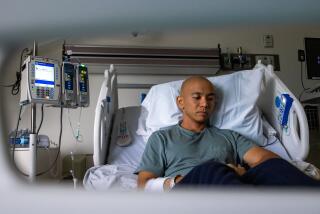They Meet--a Year After She Saved His Life : Transplant: Because of confidentiality rules, Candace Urschel didn’t know the identity of the man who received her bone marrow.
- Share via
EAST VALLEY — Wayne Gruenhagen was fidgeting in his seat, anxiously searching the milling crowd for a not-so-familiar face.
“I’m a little nervous, a little excited,” he said, picking at a plate of fruit.
The 28-year-old farmhand from Howard Lake, Minn., was at a special Red Cross dinner in Covina on Monday night, waiting to meet someone who might have saved his life. Doctors determined two years ago that he had leukemia, but a bone marrow donation from a stranger greatly increased his chances of surviving the disease.
That stranger was Candace Urschel, a 27-year-old customer service representative at the California State Bank branch in Glendora.
Urschel volunteered to become a potential marrow donor five years ago when the bank sponsored a donor drive and paid the costs for employees to be tissue-typed.
She said the decision to volunteer was natural. “My mom had a lot of medical problems, so I’ve always been involved with the Red Cross and interested in medicine,” she said. “I wanted to be able to help somebody if I could.”
Her tissue type was entered in the National Marrow Donor Program registry, which at the time listed only 17,000 potential donors. Today, there are more than 890,000 names in the registry.
About 3,700 patients with leukemia and other blood-related diseases go to the registry each year hoping to find a matching donor. The chances of finding a match can be remote as one in a million.
In the summer of 1991, Gruenhagen learned that his two brothers and his sister didn’t have marrow tissue that could help him. He also knew the national marrow registry was a long shot.
“It is a potentially fatal disease and you have to accept that fact. It helped to work on the farm, but every morning when you wake up, that’s the first thing you think about,” he said.
A few months later, the registry matched Gruenhagen with Urschel’s tissue type. Red Cross officials notified Urschel that someone might need her bone marrow. After more blood samples and a series of physical examinations, the transplant was planned for April, 1992.
“I was excited because of what I was doing and how much this person needed my help,” Urschel said. “I was thrilled that I could do something that no one else could do.”
She spent three days and two nights in the UCLA Medical Center, where doctors removed about a liter of marrow from the back of her pelvic bone. She was sore for a few days after the surgery.
The marrow was flown overnight to Minnesota, where Gruenhagen’s doctors performed the transplant. He spent two months in the hospital recovering, but the transplant was successful and he was soon regaining strength.
Because of confidentiality rules, Urschel didn’t know who received her donation and Gruenhagen didn’t know who made the donation. They weren’t allowed to find out until one year after the transplant.
But Urschel kept nagging the Red Cross for updates on the patient’s health. She prayed for him and even sent him a get-well card and a birthday card.
The marrow donation “makes you feel really close to the person even though you never met him. I felt a bonding with him,” she said.
After a year, California State Bank arranged for Gruenhagen to visit California and attend a dinner honoring Urschel and 31 other marrow donors from the area.
Gruenhagen and Urschel were introduced to each other in front of the audience. Urschel was shaking and smiling as Gruenhagen walked slowly to the front, his hands stuffed in his pockets.
He hugged her, and whispered a thank-you. They were both crying.
“I’m so proud and happy to have her system in me running my system. It’s doing one heck of a job so far,” he told the audience. “She’s given me a second chance at life. . . . I love her for everything she’s done for me.”
More to Read
Sign up for Essential California
The most important California stories and recommendations in your inbox every morning.
You may occasionally receive promotional content from the Los Angeles Times.










